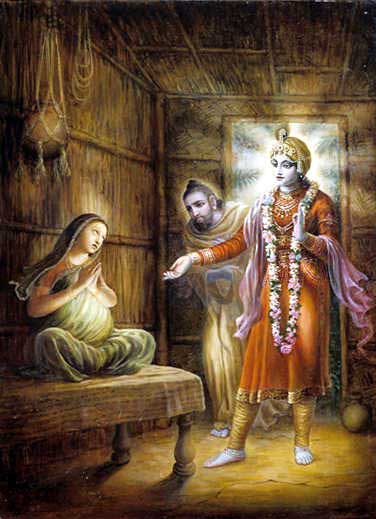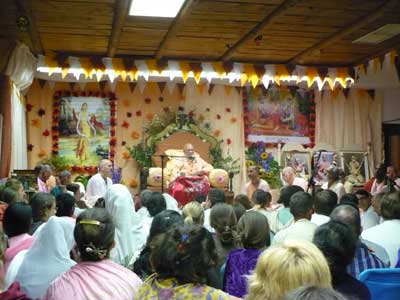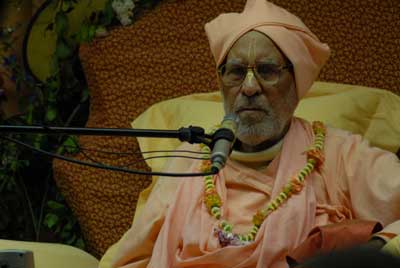Sri Srimad Bhaktivedanta Narayana Maharaja
July 8 2007
Germany
When Krsna departed from this world more than 5000 years ago, all the qualities of the transcendental world left with Him. All His qualities went with Him, and then Kali-yuga entered very soon after that.
At that time, the minds of all - ladies and males, householders, brahmacaris, and even sadhus and sannyasis - were upset. Practically everyone began to engage solely in sense gratification, and irreligious activities were performed everywhere. Anxious for the good of the people in general, approximately 88,000 sages headed by Saunaka and others gathered on the banks of Gomati River in Naimisaranya, thinking about what to do.
The disciple of Srila Sukadeva Gosvami, Ugrasrava Suta, was present there, and the sages addressed him, "O Suta Gosvami, you are a disciple of the very elevated devotee, Srila Sukadeva Gosvami, who heard the Srimad-Bhagavatam from Srila Vyasadeva himself. You also know the Vedas, Upanisads, Puranas, Mahabharata and Ramayana, and especially Srimad-Bhagavatam. Our question is about the fact that Kali-yuga is coming."
The sages continued:
prayenalpayusah sabhya
kalav asmin yuge janah
mandah sumanda-matayo
manda-bhagya hy upadrutah
["O learned one, in this iron age of Kali men have but short lives. They are quarrelsome, lazy, misguided, unlucky and, above all, always disturbed." (Srimad-Bhagavatam, 1.1.10)]
The duration of human life is very short in this Kali-yuga; it does not last more than a hundred years. Moreover, if one is not sense-controlled, he will live for only fifty years.
The word manda in this verse indicates that the intelligence of those in this Age is very small. The word sumanda-matayo means that they are not intelligent. Identifying themselves with their body, they think, "My son is mine, my wife is mine, my wealth is mine, everything in relation to my body is mine." They do not know who God is or who they are. They have no intelligence.
The word manda-bhagya means that they always endeavor for happiness, but instead only suffering comes - without inviting it. Especially, old age is bound to come, and finally one must give up one's body.
No one will go with you after you leave your body; not your dear wife, nor your children, nor your other relatives. No one will go with you. All your wealth will stay here, and you yourself do not know where you will go.
There are so many disturbances and problems, and so much quarreling in Kali-yuga, and sometimes there are diseases like cancer or TB. There are always new illnesses, and one does not know when he will die.
During the reign of Ramacandra, and also during the reign of Pariksit Maharaja, the general status quo was that a son never died before his father and no lady became a widow untimely. Everybody was happy.
Now, however, we see a son does not necessarily know the name of his father. Also, there are so many divorces here and there. It may be that the world record for divorce in the Guinness Book of World Records is that a lady has married and subsequently divorced more than twenty times. No one in this world can be happy.
The sages continued speaking to Srila Suta Gosvami:
bhurini bhuri-karmani
srotavyani vibhagasah
atah sadho 'tra yat saram
samuddhrtya manisaya
bruhi bhadraya bhutanam
yenatma suprasidati
["There are many varieties of scriptures, and in all of them there are many prescribed duties, which can be learned only after many years of study in their various divisions. Therefore, O sage, please select the essence of all these scriptures and explain it for the good of all living beings, that by such instruction their hearts may be fully satisfied." (Srimad-Bhagavatam 1.1.11)]
By your intelligence, and by your having read all scriptures like the Vedas, the Upanisads, the Gita, and especially the Bhagavata Purana, you can tell us what is their essence, by following which our soul will be happy. We are not asking how this body will be happy, but we are especially asking how the soul will be happy."
A drunkard might think he has become greatly happy by drinking vast quantities of wine, but actually he is not happy. One who eats the flesh of cows and thinks that he is very happy, is not happy. Such persons are deluded. They don't know what will be the effect of doing such things. So the sages asked, "Please tell us the essence of all the scriptures, by knowing which our soul will be happy."
Suta Gosvami became very happy by hearing this inquiry. He replied, "I am very fortunate, because you have asked me a question that inspires me to remember all the sweet pastimes of Sri Krsna and His incarnations. I will surely give you an answer."
He then offered his obeisances to his Gurudeva:
yam pravrajantam anupetam apeta-krtyam
dvaipayano viraha-katara ajuhava
putreti tan-mayataya taravo 'bhinedus
tam sarva-bhuta-hrdayam munim anato 'smi
["Srila Suta Gosvami said: 'Let me offer my respectful obeisances unto that great sage Sukadeva Gosvami, who can enter the hearts of all. When he went away to take up the renounced order of life (sannyasa), leaving home without undergoing reformation by the sacred thread or the ceremonies observed by the higher castes, his father, Srila Vyasadeva, fearing separation from him, cried out, "O my son!" Indeed, only the trees, which were absorbed in the same feelings of separation, echoed in response to the begrieved father.' " (Srimad-Bhagavatam, 1.2.2)]
Srila Sukadeva Gosvami was actually the dear parrot of Srimati Radhika - Sriyah Suka. Sriyah means 'of Radhika'. One day, Srimati Radhika was feeding pomegranates to that parrot. She placed him on Her hand and told him, "O Suka, say 'Krsna, Krsna, Krsna.'" The parrot repeated, in the same very sweet and melodious tune and voice as Srimati Radhika's: "Krsna, Krsna, Krsna".
The parrot then flew away from Her and went to Krsna's home in Nandagaon, which was situated nearby. There, Krsna was sitting with Madhu-mangala and they were talking about something. The green parrot sat on the branch of a tree that was fully laden with dark green leaves and began to speak like Srimati Radhika: "Krsna, Krsna, Krsna." Krsna asked, "Where is the sound coming from? No one is here!"
He then saw that a very beautiful parrot was sitting on the tree. He very sweetly called to the parrot, "Come on, come on," and the parrot at once came to sit on His hand.
Krsna asked him, "What are you saying again and again?"
The parrot said, "Krsna, Krsna, Krsna," and added, "I am very, very unlucky. My Svamini (mistress) is Srimati Radhika. She held me on Her hand and gave me pomegranates, and She told me to repeat 'Krsna, Krsna.' She is very merciful. She loves me so much. Unfortunately, however, because I have the nature of a bird, I flew from there and I have come here."
When Krsna heard this, He began to caress the parrot. He said, "Speak again."
In the meantime, Lalita and Visakha arrived. They said, "O Krsna, this parrot belongs to Srimati Radhika. She cannot live without him. Please give him to us."
Krsna replied, "You can call him, and if he comes to you, you can take him."
They began to call the parrot, but he did not come. They told Krsna, "If any living entity comes to You, he will get Your affection and never go anywhere else. If Srimati Radhika comes and calls him, only then will he come; otherwise not.
"Without this parrot, my sakhi Radhika will not be able to remain alive. She is very upset."
Krsna replied, "I will not give him to you. If he personally wants to go, he can go."
Then Lalita and Visakha, who were very intelligent, went to Mother Yasoda and said, "Srimati Radhika's parrot has come here. Our sakhi is very upset. Please take the bird and give him to us so that we can return him to Her."
Mother Yasoda immediately said, "Sit here and wait, I will come back very soon." She went to the place where Krsna was playing with the bird and said, "What nonsense are you doing? You are always playing with birds and animals. Come with me." She took hold of Krsna's hand and began to take Him home. "Your father is sitting and waiting for You to take bath and prasadam. You should go at once."
Sri Krsna is the Supreme Lord, the Lord of Lords, but in front of Mother Yasoda He is only a baby. He is helpless. He forgets His Godhood. He forgets that He is all-powerful.
Mother Yasoda gave the parrot to Lalita and Visakha and they returned with him to Srimati Radhika.
When Srimati Radhika and Krsna were about to conclude Their pastimes on the Earth, this parrot wanted to go with Them to Their abode, but They told him, "After we have returned, there will be no one to tell the residents of the world about Krsna-bhajana. It will be better if you remain here and preach Srimad-Bhagavatam - that which Sukadeva will tell Pariksit Maharaja. So please stay here." *[See endnote 1]
Sriya Suka remained here in this world, but he knew that without hearing Krsna's sweet pastimes, he would not be able to teach it. He therefore went to Kailasa, where Lord Sankara was telling Srimad-Bhagavatam to his wife Parvati. *[See endnote 2] While Parvati was hearing, that parrot sat on a branch of a tree that was so laden with leaves that the entire tree looked dark green.
Parvati-devi heard the First Canto, but when the subject matter of the creation of this world (sarga visarga) came up in the Second and Third Cantos, she did not have any interest; she fell asleep. She had been saying, "Go on." "Very good, go on." And when she fell asleep the parrot began to imitate her voice: "Oh yes." "Very good." "Go on." "After this?"
Sankara thought that Parvati was hearing, but when he had completed the Tenth Canto and was about to complete the Twelfth Canto, she woke up and said, "O Lord Siva, I was sleeping. I have not heard anything."
"Then who heard?" he asked. Looking here and there, he saw that a parrot was sitting on the very dark and green looking branch of the tree and was saying, "Yes yes, go on."
Sankara took up his trident and the parrot flew away. He followed the bird to kill him. Suka flew at once towards Badarikasrama, where Srila Vyasadeva was telling the same hari-katha, Srimad-Bhagavatam, to his wife Vitika, who was hearing with great wonder. While she was hearing the wonderful pastimes of Krsna lifting the Govardhana Hill, the parrot entered her stomach through her mouth.
Carrying his trident and very angry, Sankara arrived there and. he said to Srila Vyasadeva, "O Srila Vyasadeva, respectful obeisance to you."
Srila Vyasadeva asked, "Where are you coming from? You are carrying your trident. It seems that you are very angry."
"Oh yes. Have you seen any parrot coming here?"
"Why are you searching for a parrot?"
"He has heard Srimad-Bhagavatam."
"Then why do you want to kill him?"
"An unqualified person should not hear Srimad-Bhagavatam. [If an unqualified person hears what he is unqualified to hear, he may misuse it and create chaos in society. -ed] The parrot is unqualified, and yet he heard the whole Srimad-Bhagavatam."
"What is the result of hearing Srimad-Bhagavatam?"
"One becomes immortal."
"If he is immortal, how can you kill him, Sankara?"
Sankara began to laugh, and then he returned to Kailasa. The parrot was now in the womb of Srila Vyasadeva's wife, where he stayed for sixteen years.
After sixteen years passed, Srila Vyasadeva said, "Oh prabhu, who are you? I don't know who you are. Why are you giving suffering to your mother? Please come out."
The boy said, "I will not come out, where maya is present everywhere."
Do you know the meaning of Maya? Ma-ya - that which does not exist. It seems to be a fact that we are these bodies, but we are not. We think that we are these bodies; this is maya. It is maya to be attached to the body and not to Krsna, and it is because of this maya that we are suffering from the endless pain of birth and death. We know that our forefathers have died, but we think that we will not die. This is all maya. Creation, maintenance and destruction of this world are all maya.
So Suka told Vyasadeva, "I will not come into maya."
Srila Vyasadeva replied, "I will remove this maya. Please come out."
"I don't believe you."
"Who will you believe?"
"I will believe Krsna. If He will come and tell me to come out, I will do so."
Krsna came there by the prayers of Vyasadeva and said, "O my son, I am Krsna. I am removing maya just for a moment, so please come out right now."

"I believe You," Sukadeva said.
Krsna at once removed His maya. He personally sent the illusory energy far away so that Sukadeva Gosvami would come out of his mother's womb, and Sukadeva came out at that moment. There was no samskara (Vedic reformatory ritual for purifying the human being *[See Endnote 3]; no cutting of the umbilical cord. There was no yajna-upavita (giving of brahminical initiation and the sacred thread).
Sri Sukadeva Gosvami ran away towards the forest without giving any attention to Srila Vyasadeva and his wife. He was a brahmana and a renunciate from birth.
Vyasadeva thought, "I have written Srimad-Bhagavatam, but there is no qualified person in this world to whom I can teach it. From his very birth, my son has no attachment to any worldly things. He is actually qualified to hear. If he will hear, he will be able to preach this mission to the entire world."
He began to follow his son, calling out, "O Son! O Son! O Son! Come here! Come here! Please return!" But only an echo came from the forest: "Who is father? Who is son? Who is mother? Krsna is your father. Krsna is your mother. Krsna is everything." That echo came.
While Sukadeva Gosvami was entering the forest, followed by Srila Vyasadeva, there were some young heavenly damsels called Apsaras playing naked in a pond. When Sukadeva Gosvami passed by, they continued playing naked in the pond. However, when Srila Vyasadeva, who was very old and had very long, white hair, came by, they at once ran away. They quickly put on their garments and offered their obeisances to Srila Vyasadeva from very far away.
Srila Vyasadeva asked them, "Oh, my daughters of daughters of daughters, I am older than your grandfather's grandfather. When you saw my young, beautiful, naked son, you were not embarrassed at all. But I am so old. You are young enough to be my great-grand-daughters, but when you saw me, you felt shame. You at once dressed yourselves in your garments and offered obeisances. Why?"
The Apsaras replied, "Your son does not see whether someone is a man, a lady, a tree, or a creeper. He only sees the soul and the Supersoul everywhere. But you spoke to us, addressing us as your great-granddaughters. This is why we became so shy in front of you."
After this, Srila Vyasadeva wrote a verse and taught it to some hunters. He told them that if they would sing this verse, they would be able to capture many birds in the forest. They went to the forest and recited Srila Vyasadeva's verse:
barhapidam nata-vara-vapuh karnayoh karnikaram
bibhrad vasam kanaka-kapisam vaijayantim ca malam
randhran venor adhara-sudhayapurayan gopa-vrndair
vrndaranyam sva-pada-ramanam pravisad gita-kirtih
[Wearing a peacock-feather ornament upon His head, blue karnikara flowers on His ears, a yellow garment as brilliant as gold, and the vaijayanti garland, Lord Krsna exhibited His transcendental form as the greatest of dancers as He entered the forest of Vrndavana, beautifying it with the marks of His footprints. He filled the holes of His flute with the nectar of His lips, and the cowherd boys sang His glories. (Srimad-Bhagavatam, 10.21.5)]
This is a very beautiful description of Krsna, found in the Srimad-Bhagavatam. Hearing it from the hunters, Srila Sukadeva Gosvami was at once attracted. He came to them and asked, "Who has taught you this? Please ask him to explain the qualities of the person described in this verse?"
The next day the hunters returned to Srila Vyasadeva, and he gave them another verse:
aho baki yam stana-kala-kutam
jighamsayapayayad apy asadhvi
lebhe gatim dhatry-ucitam tato 'nyam
kam va dayalum saranam vrajema
["Alas, how shall I take shelter of one more merciful than He who granted the position of mother to a she-demon although she was unfaithful and she prepared deadly poison to be sucked from her breast?" (Srimad-Bhagavatam, 3.2.23)]
The witch Putana went to Vrndavana to kill Krsna, having put poison on her breast, but Krsna is so merciful that after killing her He gave her a destination like a mother (His nurse). Who can be as merciful as Krsna? Who is there to take shelter of besides Krsna?
After hearing this verse, Sukadeva came to Srila Vyasadeva, who then taught him the entire Srimad-Bhagavatam.
As mentioned earlier, Suta Gosvami had been asked by the sages of Naimisaranya how the soul can be happy. So now, having been requested by the sages of Naimisaranya to speak about the essence of the revealed scriptures, Sri Suta Gosvami offered his humble obeisances to his Gurudeva, Sukadeva Gosvami, because he was going to begin reciting Srimad-Bhagavatam.
Sri Suta Gosvami prayed:
yah svanubhavam akhila-sruti-saram ekam
adhyatma-dipam atititirsatam tamo 'ndham
samsarinam karunayaha purana-guhyam
tam vyasa-sunum upayami gurum muninam
["Let me offer my respectful obeisances unto him , the spiritual master of all sages, the son of Vyasadeva, who, out of his great compassion for those gross materialists who struggle to cross over the darkest regions of material existence, spoke this most confidential supplement to the cream of Vedic knowledge, after having personally assimilated it by experience." (Srimad-Bhagavatam 1.2.3)]
This Srimad-Bhagavatam is the very essence of the entire Vedic literature: the Puranas, and Mahabharata, Ramayana, Bhagavad-Gita and all other scriptures. The Srimad-Bhagavatam is like a lamp. By the help of a lamp we can see ourselves and others in the darkness. Similarly, by reading and following Srimad-Bhagavatam and hearing from any bona fide Guru, we can see transcendental Krsna along with His associates and sweet pastimes.
Srila Vyasadeva taught his son with compassion, and with great mercy for the entire world and all living entities. We should hear Srimad-Bhagavatam.
To be continued...
[*Endnote 1 - This history is related in Sri Kavi Karnapura's book, Ananda Vrndavana Campu.
[*Endnote 2 - The Bhagavatam is eternal and Srila Sukadeva Gosvami is eternal. The Bhagavatam is the story of Bhagavan (the Supreme Personality of Godhead and his devotees. When it is retold and retold, the context of each subsequent retelling is added to the text, but it is still Bhagavatam. Before it was written down by Srila Vyasadeva, it was coming as oral tradition. Even the original four verses were called Bhagavatam until it was gradually expanded.
So the Bhagavatam existed before Srila Vyasadeva realized it in this trance and then revised it and taught it to Sukadeva Gosvami. Srimad-Bhagavatam (1.7.8) states: "The great sage Vyasadeva, after compiling the Srimad-Bhagavatam and revising it, taught it to his own son, Sri Sukadeva Gosvami, who was already engaged in self-realization."]
[*Endnote 3 - Samskaras are impressions on the mind of previous experiences or acts done in a former state of existence. In this context the word refers to Vedic reformatory rituals which are performed from the time of conception until death. Their purpose is to purify the human being.]

Editor: Syamarani dasi
Transcriber: Krsna-vallabha dasi
Typist: Janaki dasi
Proof-reader: Krsna-kamini dasi









